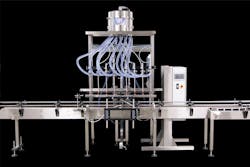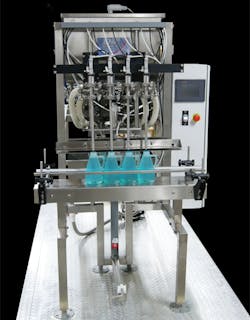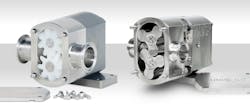Chemical packaging lines can use multiple types of liquid fillers including gravity and pressure-gravity fillers. The type of filler used will depend on the type of chemical, specific application and the facility.
Common uses of fillers for chemical packaging lines
Different types of chemicals require unique equipment that’s capable of safely handling and packaging these substances. Production facilities often utilize chemical packaging lines to fill and package products such as:
- Janitorial and cleaning supplies
- Agricultural and industrial chemicals
- Automotive and petroleum products
- Acid and corrosive products
- Paint, sealant and stain products
- Personal care and cosmetic products
With filler selection based primarily on the type of chemical used, many options are available depending on corrosiveness and other factors, including viscosity, quantity and the required speed settings for processing.
A combination of these factors will help one determine how to select the right fillers and other packaging machinery for specific production lines. For example, liquids of higher viscosities will need fillers that apply sufficient pressure to maintain a consistent filling speed and volume level, while bulk quantities of products will benefit from the use of automated equipment as opposed to manual machinery.
With so many options available, it’s best to work with a company that can help you make the right decision to maximize both efficiency and cost-effectiveness.
Four-head volumetric piston filler featuring frame and tank manufactured from 304 stainless steel (SS) and all 316 SS wetted parts. Well-suited for many production environments and a wide range of products and containers
Types of liquid-filling machines
Liquid filler types include:
Net weigh fillers
Net-weigh filling machines are designed for use in applications that require containers to have consistent fill levels. This makes them ideal for bulk packaging applications and for the packaging of products of high value that require consistent accuracy, such as black printer ink, expensive perfumes and valuable pharmaceuticals like insulin.
Piston fillers
Piston-filling machines are useful for packaging high-viscosity liquids. They offer consistently speedy and accurate fill rates and a versatile design that enables them to handle many different types of liquids. They are often used to handle thicker fluids such as batters, pastes and aerated liquids. These liquids are normally squeezed using pastry bags and other packaging types that work in a similar fashion.
Pump fillers
Pump-filling equipment is used to fill liquids of all viscosity levels into a wide variety of containers. They can work with various types of pumps, including rotor pumps, lobe pumps and gear pumps. Certain parts such as fittings and valves will also depend on the specific application.
Overflow fillers
Overflow fillers are ideal for filling liquids with lower viscosity levels. Like net-weigh filling machines, they are ideal for installation in systems that require consistent fill levels, which is particularly useful when filling transparent containers. Vacuum overflow fillers are also used to fill small volume glass containers, along with other specialty applications.
Gravity/pressure-gravity filling machines for liquid chemicals
Gravity and pressure-gravity filling machines are often used to fill chemicals that are of low-to-medium viscosity levels. While gravity fillers mainly rely on gravity to fill products, pressure-gravity fillers apply additional pressure using a pump to fill thicker
liquids when needed. This is why gravity-filling systems are typically utilized to fill foamy or thin liquids, while pressure-gravity fillers can fill more viscous fluids.
Many thicker chemicals can benefit from packaging systems using pressure-gravity fillers. These products include pharmaceuticals, SAE 70 oil, glues and many others.
Facilities can use either traditional, fully integrated pressure-gravity fillers for packaging, or they can use tabletop pressure-filling machines that are more ideal for low-volume production lines. Pressure-gravity fillers are also used to fill containers of nearly any shape and size based on the specifications of the application.
Eight-head poly filler featuring robust construction from HDPE, UHMW and PVC, which holds up to corrosive environments. Suitable for bottling water-thin to medium consistent viscosity liquids
Other filler types frequently used for chemical products
Along with traditional liquid fillers and gravity fillers, there are other types of liquid-filling machines that facilities can use based on their specific needs such as the following:
Molten-filling machines
Molten products including candles will need to be heated when filling before being cooled and hardening in the packaging. These products will require the use of molten-filling machines that can handle high-temperature fluids without safety hazards or risks of damage.
Corrosive fillers
Corrosive filling machines are typically built using HDPE and are designed to function in highly corrosive environments. Acidic chemicals and other corrosive liquids could cause damage to machinery over time without proper filling processes in place, but these issues can easily be avoided with the use of specialized corrosive fillers.
Chemical-filling system integration based on application needs
Whether pressure-gravity fillers or other types of machinery are needed, many options are available for applications of all types. By selecting the right machinery for your facility and products, you can minimize the risk of damage, breakdowns and subsequent downtime that might otherwise compromise your systems.
Krys Beal, part of E-PAK Machinery Inc.’s inside sales and marketing department, has more than 19 years of experience in the manufacturing equipment industry with expertise in filling, capping and bottling equipment.



